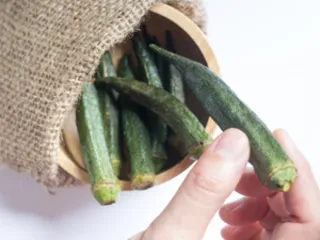Healthy vegetables lose weight recipes, high fiber and low calories, eat slim

When losing weight, you should choose some seasonal diet foods. Today, I recommend two seasonal summer vegetables-okra and bamboo shoots. These two vegetables are not only high in fiber, low in calories, but also easy to fill your stomach. Make them into a diet diet, simple and delicious, and is the best choice for weight loss!
okra
Okra prefers warmth, water resistance, wind resistance and heat resistance, but it is not cold resistant and should not be stored for a long time. It belongs to summer vegetables. Because the fruit is long in shape, like a croissant's horn, it is also called "croissant".
Birth date: March to November, and the rich period is from June to October.
Shopping tips
1. Choosing okra with a fruit length of less than 10 cm is tender and has a better taste. If it exceeds 10 centimeters, it will be too old and the taste will be poor.
2. Don't choose okra with moth-eaten marks on the fruit body, because the inside may be rotten.
3. Choose a plump and straight shape to make okra with good growth and better quality.
4. Don't select black spots on the body of the fruit, which means that the transportation process of okra has been damaged, its quality has been damaged, and it is easy to rot.
Keep tips. It is best to buy it on the same day and eat it on the same day. If you need to preserve it, you can wrap it in white newspaper, then wrap it in a plastic bag or plastic wrap, and place it in the refrigerator for refrigeration. It is recommended to eat it within two days, otherwise it will easily age.
Pay attention before eating. Without removing the pedicel first, wash it with running water, and soak it for about an hour before cooking.
Cooking Diversion
The most common way to eat okra is to blanch and eat it directly. During the scalding process, add a little sugar, salt and salad oil to keep the color green; after scalding, wash it with cold water to keep the taste crisp and tender.
weight loss recipes
Although okra is not high in calories, it can provide rich dietary fiber and contains a lot of minerals, such as potassium, calcium, magnesium, etc. People who want to lose weight can directly boil okra and dip it in thin salt and soy sauce to eat it. It can provide a feeling of fullness and chewing, making it difficult for people to feel hungry.
White bamboo shoots
Starting from May every year, white bamboo shoots are on the market one after another. Bamboo shoots are also known as bamboo shoots, water bamboo shoots, and beauty legs. Because they are rich in dietary fiber, they are very suitable for weight loss.
Birth date: May to November, and the rich period is from May to July.
Shopping essentials
1. You can press the bamboo shoots with your hands to confirm whether they are firm and plump. Full white bamboo shoots represent sufficient moisture and good taste.
2. When selecting, it is better to pay attention to the white part of the bamboo shoot not to appear in turquoise color, because the white bamboo shoot is turquoise, which means that the white bamboo shoot has aged and small black spots will appear after being cut inside.
Keep tips. White bamboo shoots contain a lot of water, and if left for too long, they may easily lose water and age. It is recommended to consume it early after purchase. If wrapped in newspaper, wrapped in plastic bags and placed in the refrigerator for refrigeration, it can be stored for about 4 days.
Pay attention before eating. After you buy it home, you don't need to clean it immediately. Before cooking, wash it with clean water.
Cooking Diversion
Because white bamboo shoots do not easily absorb oil, there is no need to add too much oil during the cooking process.
weight loss recipes
White bamboo shoots have low calories and are very suitable for eating when losing weight. They not only give you a feeling of satiety, but also give you the pleasure of chewing. After washing the white bamboo shoots, wrap the white bamboo shoots with tin foil paper, and roast them to achieve the sweetness of the white bamboo shoots. They are very delicious without seasoning.
experts say
·White bamboo shoots and okra are very refreshing whether they are cold or directly blanched, so people may wish to make more use of them.
·Bamboo shoots and okra are low-calorie and high-dietary fiber vegetables. Especially okra, its calcium content is equivalent to fresh milk. People who are not adapted to dairy products can consume more.
·Okra has the function of protecting the stomach wall and stabilizing the intestinal mucosa, which has many benefits, while white bamboo shoots have the effect of clearing heat and detoxifying, but do not eat them with legumes to avoid stones or gout.
·These two vegetables are delicious when blanched. They are simple and effortless, and they are also very refreshing when used cold.

[Benefit: Come and see how you should lose weight?]
Want to lose weight healthily? Want to get a weight loss plan to lose 8 pounds a month?